初中英语一般疑问句和特殊疑问句知识点总结
- 格式:pdf
- 大小:103.19 KB
- 文档页数:5
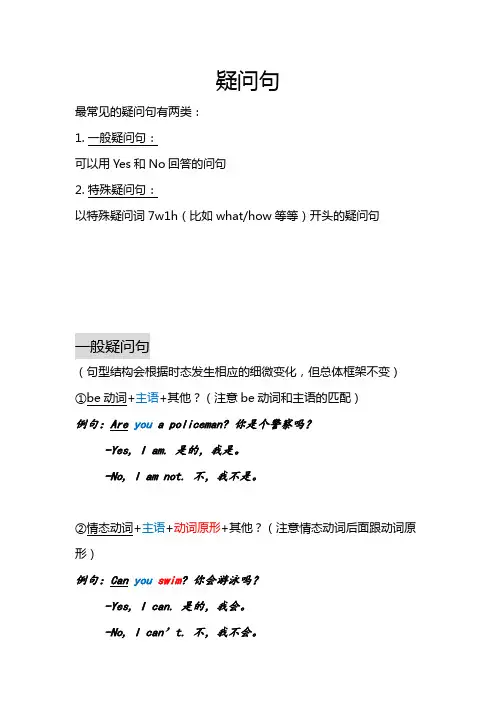
疑问句最常见的疑问句有两类:1.一般疑问句:可以用Yes和No回答的问句2.特殊疑问句:以特殊疑问词7w1h(比如what/how等等)开头的疑问句一般疑问句(句型结构会根据时态发生相应的细微变化,但总体框架不变)①be动词+主语+其他?(注意be动词和主语的匹配)例句:Are you a policeman? 你是个警察吗?-Yes, I am. 是的,我是。
-No, I am not. 不,我不是。
②情态动词+主语+动词原形+其他?(注意情态动词后面跟动词原形)例句:Can you swim? 你会游泳吗?-Yes, I can. 是的,我会。
-No, I can’t. 不,我不会。
③助动词+主语+动词原形+其他?(注意助动词和主语的匹配)例句:Do you like dancing? 你喜欢跳舞吗?-Yes, I do. 是的,我喜欢。
-No, I don’t. 不,我不喜欢。
Do you go to school every day? 你每天去学校吗?做句型转换的方法(如何将陈述句变成一般疑问句):先看句子中是否有be动词或者情态动词A.如果有be动词或者情态动词,对照一般疑问句句型①/②将be动词或者情态动词提到句首,其他部分依次照抄B.如果没有be动词或者情态动词,对照一般疑问句句型③句首+助动词(注意是否要和主语匹配变化),其他部分依次照抄,注意原来的动词要变为原形#无论是哪一种情况,都要注意第一人称要变成第二人称,第二人称要变成第一人称(you和I的切换)特殊疑问句(句型结构会根据时态发生相应的细微变化,但总体框架不变)①特殊疑问词(作主语)+谓语+其他?(陈述句语序)例句:Who is reading a book? 谁正在读书?Which is the biggest? 哪个是最大的?Who likes dancing? 谁喜欢跳舞?②特殊疑问词(作主语修饰语)+主语+谓语+其他?(陈述句语序)例句:Whose bag is red? 谁的包是红色的?How many people work in the school?有多少人在学校工作?③特殊疑问词+一般疑问句(详见上面的一般疑问句结构)?(此情况为当特殊疑问词代替的部分不是主语或者主语修饰语时)例句:What are you doing? 你在做什么?What colour do you like? 你喜欢什么颜色?做句型转换的方法(如何将句子转变成特殊疑问句):先看划线部分是否为句子中的主语或者主语修饰语A.如果是主语,对照特殊疑问句句型①划线部分用特殊疑问词代替,其他部分照抄(该疑问句为陈述句语序)B.如果是主语修饰语,对照特殊疑问句句型②划线部分用特殊疑问词代替,其他部分照抄(该疑问句为陈述句语序)C.如果不是主语或者主语修饰语,对照特殊疑问句句型③先将原来的陈述句变成一般疑问句(如果本来就是一般疑问句就不需要再做修改)划线部分用特殊疑问词代替再将特殊疑问词提前到句首#如果划线部分是动词或者动词短语,表示做什么事,那变为特殊疑问词的时候要用do what 代替特殊疑问词主要分为两类:wh- (wh开头的疑问词)和how - (how开头的疑问词)How often:多长时间一次,问频率。
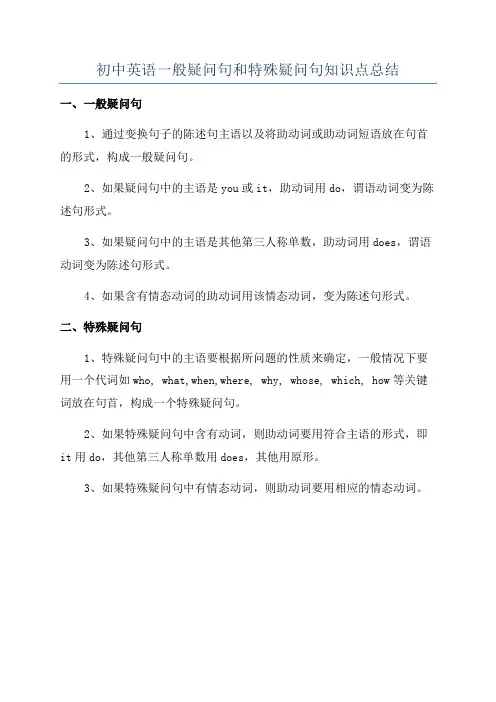
初中英语一般疑问句和特殊疑问句知识点总结
一、一般疑问句
1、通过变换句子的陈述句主语以及将助动词或助动词短语放在句首的形式,构成一般疑问句。
2、如果疑问句中的主语是you或it,助动词用do,谓语动词变为陈述句形式。
3、如果疑问句中的主语是其他第三人称单数,助动词用does,谓语动词变为陈述句形式。
4、如果含有情态动词的助动词用该情态动词,变为陈述句形式。
二、特殊疑问句
1、特殊疑问句中的主语要根据所问题的性质来确定,一般情况下要用一个代词如who, what,when,where, why, whose, which, how等关键词放在句首,构成一个特殊疑问句。
2、如果特殊疑问句中含有动词,则助动词要用符合主语的形式,即it用do,其他第三人称单数用does,其他用原形。
3、如果特殊疑问句中有情态动词,则助动词要用相应的情态动词。
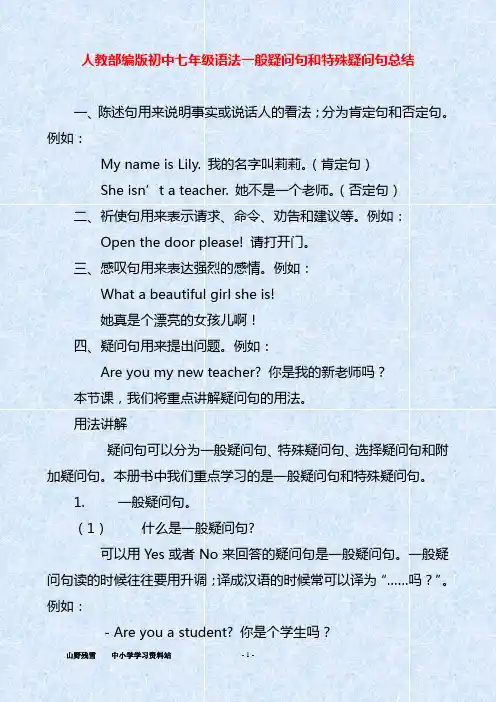
人教部编版初中七年级语法一般疑问句和特殊疑问句总结一、陈述句用来说明事实或说话人的看法;分为肯定句和否定句。
例如:My name is Lily. 我的名字叫莉莉。
(肯定句)She isn’t a teacher. 她不是一个老师。
(否定句)二、祈使句用来表示请求、命令、劝告和建议等。
例如:Open the door please! 请打开门。
三、感叹句用来表达强烈的感情。
例如:What a beautiful girl she is!她真是个漂亮的女孩儿啊!四、疑问句用来提出问题。
例如:Are you my new teacher? 你是我的新老师吗?本节课,我们将重点讲解疑问句的用法。
用法讲解疑问句可以分为一般疑问句、特殊疑问句、选择疑问句和附加疑问句。
本册书中我们重点学习的是一般疑问句和特殊疑问句。
1. 一般疑问句。
(1)什么是一般疑问句?可以用Yes或者No来回答的疑问句是一般疑问句。
一般疑问句读的时候往往要用升调;译成汉语的时候常可以译为“……吗?”。
例如:-Are you a student? 你是个学生吗?-Yes, I am. 是的,我是。
-Can you speak English? 你会说英语吗?-Yes, I can. 是的,我会。
-Do you go to school every day? 你每天都上学吗?-No, I don’t. 不,不是。
(2)如何将陈述句变成一般疑问句?①句中有be动词(am,is,are,was,were等)、助动词(do,does,did,have,had等)或情态动词(can,must,will,may等)时,将其提到句首,句末加上问号即可。
例如:he is a clever girl. 她是个聪明的女孩。
→Is she a clever girl? 她是个聪明的女孩吗?I can swim. 我会游泳。
→Can you swim? 你会游泳吗?②如果句中没有be动词、助动词或情态动词,则要根据不同的时态在句首加上相应的助动词来构成一般疑问句。
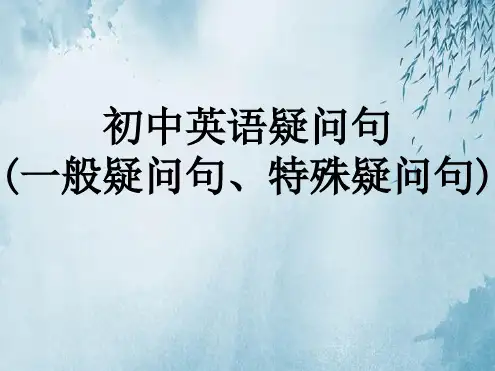
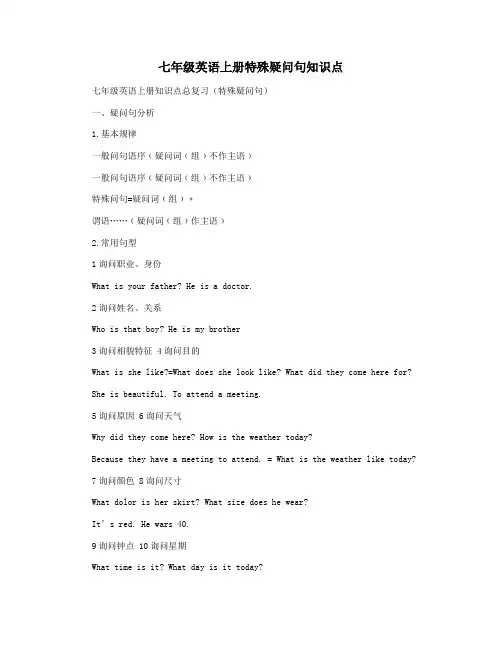
七年级英语上册特殊疑问句知识点七年级英语上册知识点总复习(特殊疑问句)一、疑问句分析1.基本规律一般问句语序﹙疑问词﹙组﹚不作主语﹚一般问句语序﹙疑问词﹙组﹚不作主语﹚特殊问句=疑问词﹙组﹚﹢谓语……﹙疑问词﹙组﹚作主语﹚2.常用句型1询问职业、身份What is your father? He is a doctor.2询问姓名、关系Who is that boy? He is my brother3询问相貌特征 4询问目的What is she like?=What does she look like? What did they come here for? She is beautiful. To attend a meeting.5询问原因 6询问天气Why did they come here? How is the weather today?Because they have a meeting to attend. = What is the weather like today? 7询问颜色 8询问尺寸What dolor is her skirt? What size does he wear?It’s red. He wars 40.9询问钟点 10询问星期What time is it? What day is it today?It’s 7:30. It’s Tuesday.11询问几号 12询问年龄What is the date today? How old is he?It’s May 2. He is 38.13询问多久 14询问长度How long have you been here? How long is the bridge?For five months. It’s 500 metres.15询问距离 16询问频度How far is it from here to the zoo? How often do you come back?It’s 6 kilometres. Once a week.17询问多快 18询问数量How soon will she arrive? How many jackets do you have?In an week. How much coffee do you want?19询问价格 20询问高度How much is it? How tall is she?How much does it cost? How high is the tower?二.难点讲评1.What’s your favorite subject?你最喜欢的学科是什么?释:1favorite是形容词“最喜欢的”,作定语或表语。
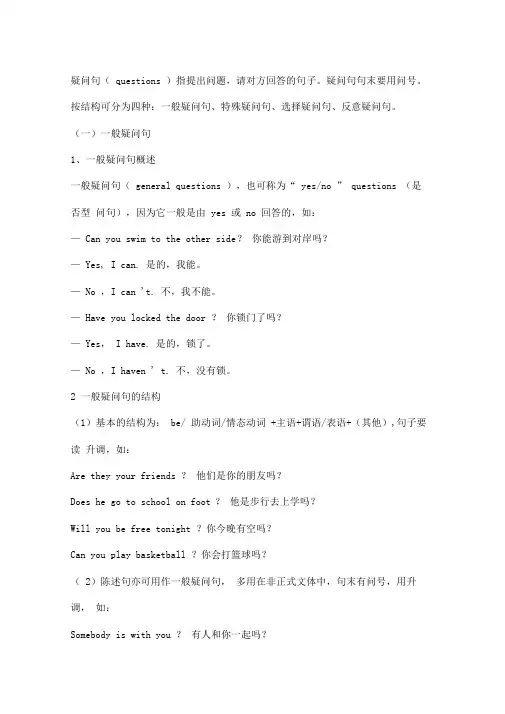
疑问句( questions )指提出问题,请对方回答的句子。
疑问句句末要用问号。
按结构可分为四种:一般疑问句、特殊疑问句、选择疑问句、反意疑问句。
(一)一般疑问句1、一般疑问句概述一般疑问句( general questions ),也可称为“ yes/no ” questions (是否型问句),因为它一般是由 yes 或 no 回答的,如:— Can you swim to the other side ?你能游到对岸吗?— Yes, I can. 是的,我能。
— No ,I can 't. 不,我不能。
— Have you locked the door ?你锁门了吗?— Yes, I have. 是的,锁了。
— No ,I haven ' t. 不,没有锁。
2 一般疑问句的结构(1)基本的结构为: be/ 助动词/情态动词 +主语+谓语/表语+(其他),句子要读升调,如:Are they your friends ?他们是你的朋友吗?Does he go to school on foot ?他是步行去上学吗?Will you be free tonight ?你今晚有空吗?Can you play basketball ?你会打篮球吗?( 2)陈述句亦可用作一般疑问句,多用在非正式文体中,句末有问号,用升调,如:Somebody is with you ?有人和你一起吗?He didn ' t finish the work ?他没有做完活吗?You are fresh from America , I suppose ?我猜,你刚从美国回来吧?3、一般疑问句的答语( 1)一般疑问句一般由 yes 或 no 来回答,如:— Are you tired ?你累了吗?— Yes,I am. 是的 ,累了。
— No, I ' m not. 不,不累。
— Does she do the cleaning ?她扫除了吗?— Yes , she does. 是的,她打扫了。
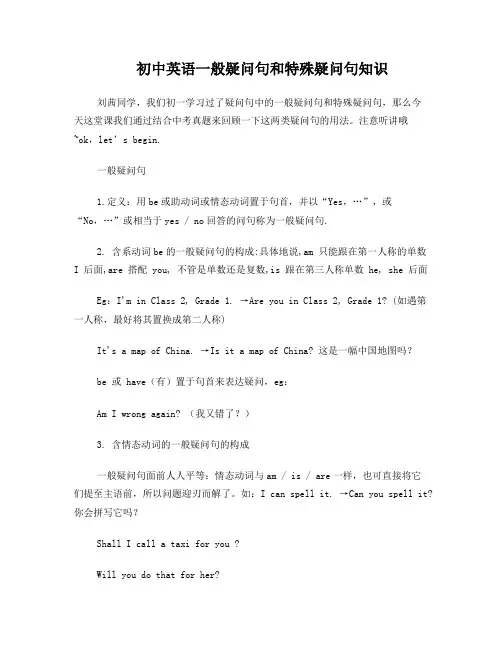
初中英语一般疑问句和特殊疑问句知识刘茜同学,我们初一学习过了疑问句中的一般疑问句和特殊疑问句,那么今天这堂课我们通过结合中考真题来回顾一下这两类疑问句的用法。
注意听讲哦~ok,let’s begin.一般疑问句1.定义:用be或助动词或情态动词置于句首,并以“Yes,…”,或“No,…”或相当于yes / no回答的问句称为一般疑问句.2. 含系动词be的一般疑问句的构成:具体地说,am 只能跟在第一人称的单数I 后面,are 搭配 you, 不管是单数还是复数,is 跟在第三人称单数 he, she 后面Eg:I'm in Class 2, Grade 1. →Are you in Class 2, Grade 1? (如遇第一人称,最好将其置换成第二人称)It's a map of China. →Is it a map of China? 这是一幅中国地图吗?be 或 have(有)置于句首来表达疑问,eg:Am I wrong again? (我又错了?)3. 含情态动词的一般疑问句的构成一般疑问句面前人人平等:情态动词与am / is / are一样,也可直接将它们提至主语前,所以问题迎刃而解了。
如:I can spell it. →Can you spell it? 你会拼写它吗?Shall I call a taxi for you ?Will you do that for her?Can she drive?4. 含实义动词的一般疑问句的构成含实义动词的一般疑问句的构成稍微有点讲究,要在句首加do;如逢主语为第三人称单数,谓语动词为一般现在时单数第三人称形式"v-(e)s"时,用does,并要将谓语动词变回原形(如has→h ave,likes→like 等);有时陈述句中的some还要变作any等。
如:She lives in Beijing. →Does she live in Beijing?I like English. →Do you like English?There are some books on my desk.→Are there any books on your desk?5. 一般疑问句的应答用yes / no回答,并怎么问怎么答(句首为情态动词/am / is / are还是do /does),简略回答时要注意缩写(否定的n't)和采用相应的人称代词以避免重复:即"Yes,主语(代词)+情态动词或am / is / are或do / does."表示肯定;"No,主语(代词)+情态动词或am / is / are或者do / does not(n't)."表示否定。
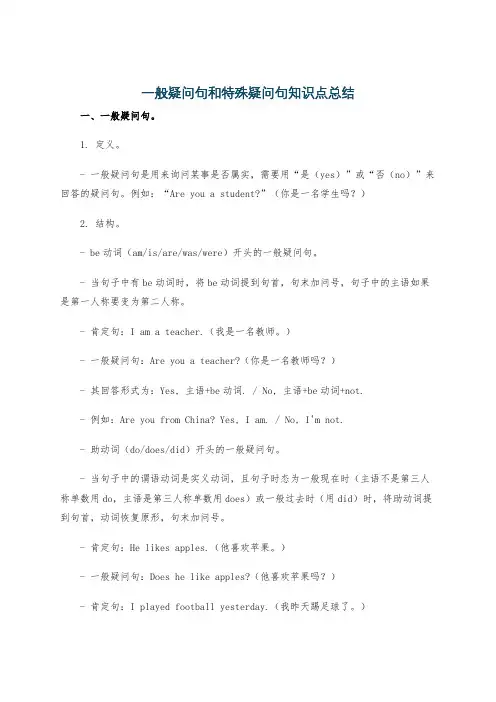
一般疑问句和特殊疑问句知识点总结一、一般疑问句。
1. 定义。
- 一般疑问句是用来询问某事是否属实,需要用“是(yes)”或“否(no)”来回答的疑问句。
例如:“Are you a student?”(你是一名学生吗?)2. 结构。
- be动词(am/is/are/was/were)开头的一般疑问句。
- 当句子中有be动词时,将be动词提到句首,句末加问号,句子中的主语如果是第一人称要变为第二人称。
- 肯定句:I am a teacher.(我是一名教师。
)- 一般疑问句:Are you a teacher?(你是一名教师吗?)- 其回答形式为:Yes, 主语+be动词. / No, 主语+be动词+not.- 例如:Are you from China? Yes, I am. / No, I'm not.- 助动词(do/does/did)开头的一般疑问句。
- 当句子中的谓语动词是实义动词,且句子时态为一般现在时(主语不是第三人称单数用do,主语是第三人称单数用does)或一般过去时(用did)时,将助动词提到句首,动词恢复原形,句末加问号。
- 肯定句:He likes apples.(他喜欢苹果。
)- 一般疑问句:Does he like apples?(他喜欢苹果吗?)- 肯定句:I played football yesterday.(我昨天踢足球了。
)- 一般疑问句:Did you play football yesterday?(你昨天踢足球了吗?)- 回答形式为:Yes, 主语+do/does/did. / No, 主语+don't/doesn't/didn't.- 例如:Do they go to school by bike? Yes, they do. / No, they don't.- 情态动词(can/could/may/must等)开头的一般疑问句。
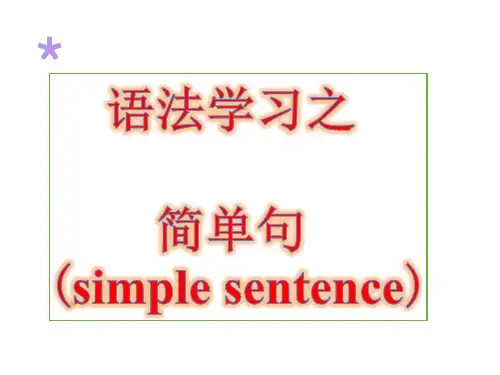
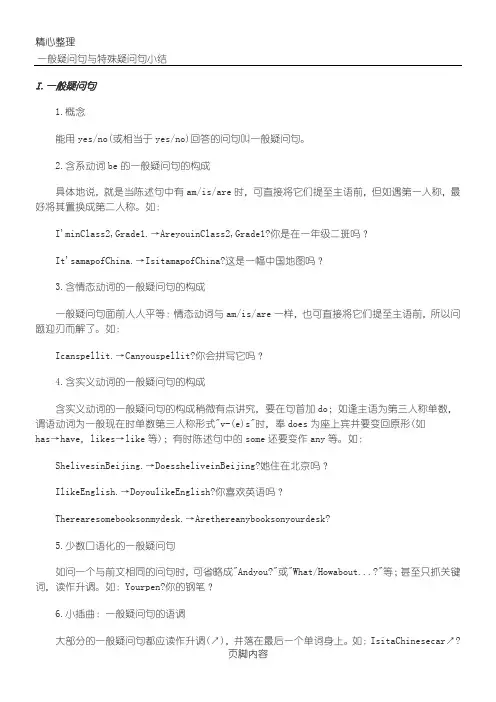
一般疑问句与特殊疑问句小结I.一般疑问句1.概念能用yes/no(或相当于yes/no)回答的问句叫一般疑问句。
2.含系动词be的一般疑问句的构成具体地说,就是当陈述句中有am/is/are时,可直接将它们提至主语前,但如遇第一人称,最好将其置换成第二人称。
如:It'samapofChina.→IsitamapofChina?3.含情态动词的一般疑问句的构成一般疑问句面前人人平等:情态动词与所以问题迎刃而解了。
如:4.do;如逢主语为第三人称单数,时,奉does为座上宾并要变回原形(如has→have还要变作any等。
如:她住在北京吗?Therearesomebooksonmydesk.→Arethereanybooksonyourdesk?5.少数口语化的一般疑问句如问一个与前文相同的问句时,可省略成"Andyou?"或"What/Howabout...?"等;甚至只抓关键词,读作升调。
如:Yourpen?你的钢笔?6.小插曲:一般疑问句的语调大部分的一般疑问句都应读作升调(↗),并落在最后一个单词身上。
如:IsitaChinesecar↗?7.一般疑问句的应答用yes/no(或相当于yes/no的词)回答,并怎么问怎么答(句首为情态动词am/is/are还是do/does),简略回答时要注意缩写(否定的n't)和采用相应的人称代词以避免重复:即"Yes,主语(代词)+情态动词或am/is/are或do/does."表示肯定;"No,主语(代词)+情态动词或am/is/are 或者do/doesnot(n't)."表示否定。
如:①-IsMaryaJapanesegirl?玛丽是日本女孩吗?-Yes,sheis./No,sheisn't.是的,她是。
/不,她不是。
②-CanLilyspeakChinese?-No,shecan't./Sorry,Idon'tknow.③-DoyoulikeEnglish?你喜欢英语吗?-Yes,verymuch.是的,非常喜欢。
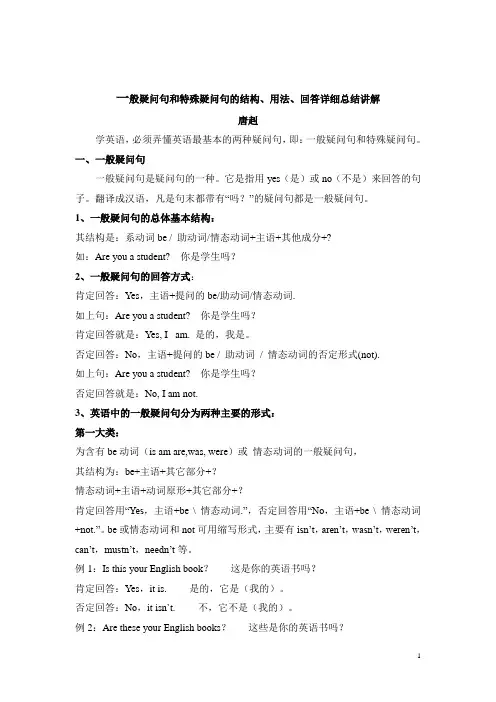
一般疑问句和特殊疑问句的结构、用法、回答详细总结讲解唐赳学英语,必须弄懂英语最基本的两种疑问句,即:一般疑问句和特殊疑问句。
一、一般疑问句一般疑问句是疑问句的一种。
它是指用yes(是)或no(不是)来回答的句子。
翻译成汉语,凡是句末都带有“吗?”的疑问句都是一般疑问句。
1、一般疑问句的总体基本结构:其结构是:系动词be / 助动词/情态动词+主语+其他成分+?如:Are you a student? 你是学生吗?2、一般疑问句的回答方式:肯定回答:Yes,主语+提问的be/助动词/情态动词.如上句:Are you a student? 你是学生吗?肯定回答就是:Yes, I am. 是的,我是。
否定回答:No,主语+提问的be / 助动词/ 情态动词的否定形式(not).如上句:Are you a student? 你是学生吗?否定回答就是:No, I am not.3、英语中的一般疑问句分为两种主要的形式:第一大类:为含有be动词(is am are,was, were)或情态动词的一般疑问句,其结构为:be+主语+其它部分+?情态动词+主语+动词原形+其它部分+?肯定回答用“Yes,主语+be \ 情态动词.”,否定回答用“No,主语+be \ 情态动词+not.”。
be或情态动词和not可用缩写形式,主要有isn’t,aren’t,wasn’t,weren’t,can’t,mustn’t,needn’t等。
例1:Is this your English book?这是你的英语书吗?肯定回答:Yes,it is. 是的,它是(我的)。
否定回答:No,it isn`t. 不,它不是(我的)。
例2:Are these your English books?这些是你的英语书吗?肯定回答:Yes,they are. 是的,它们是。
否定回答:No,they aren’t.不,它们不是。
例3: Can you speak English? 你能讲英语吗?(本句式含有情态动词can 的一般疑问句)肯定回答:Yes,I can. 是的,我能。
(一)由be(am,is,are)引导的一般疑问句1、Am I a student? 我是学生吗? Yes,you are./ No,you aren’t.2、Is this /that/it a chair?这/那/它/是一把椅子吗? Yes,it is. /No,it isn’t.3、Is she/Amy your sister?她/艾米是你的妹妹吗?Yes,she is ./ No,she isn’t.4、Is he/Mike your brother?他/迈克是你的哥哥吗?Yes,he is./No,he isn’t.5、Is your brother helpful at home? 你哥哥在家有用吗?Yes, he is./ No, he isn’t.6、Is there a forest in the park? 在公园有一个森林吗?Yes,there is./No,there isn’t. 是的,有。
/不,没有。
7、Are there any panda s in the mountains?在山上有熊猫吗?Yes,there are./No,there aren’t.是的,有。
/不,没有。
8、Are they dusk s? 它们是鸭子吗?(问物)Yes, they are. /No,they aren’t.是的,它们是。
/不,它们不是。
9、Are they famers? 他们是农民吗?(问人)Yes, they are. /No,they aren’t. 是的,他们是。
/不,他们不是。
10、Are you a teacher?你是一个老师吗?(问you 用I回答)Yes, I am./No,I’m not.是的,我是。
/不,我不是。
11、Are you teacher s?你们是老师吗?</P< p>Yes,we are./No,we aren’t.是的,我们是。
一般疑问句与特殊疑问句小结I. 一般疑问句1. 概念能用yes / no或相当于yes / no回答的问句叫一般疑问句;2. 含系动词be的一般疑问句的构成具体地说,就是当陈述句中有am /is / are时,可直接将它们提至主语前,但如遇第一人称,最好将其置换成第二人称;如:I'm in Class 2, Grade 1. →Are you in Class 2, Grade 1 你是在一年级二班吗It's a map of China. →Is it a map of China 这是一幅中国地图吗3. 含情态动词的一般疑问句的构成一般疑问句面前人人平等:情态动词与am / is / are一样,也可直接将它们提至主语前,所以问题迎刃而解了;如:I can spell it. →Can you spell it 你会拼写它吗4. 含实义动词的一般疑问句的构成含实义动词的一般疑问句的构成稍微有点讲究,要在句首加do;如逢主语为第三人称单数,谓语动词为一般现在时单数第三人称形式"v-es"时,奉does为座上宾并要变回原形如has→have,likes→like等;有时陈述句中的some还要变作any等;如:She lives in Beijing. →Does she live in Beijing 她住在北京吗I like English. →Do you like English 你喜欢英语吗There are some books on my desk.→Are there any books on your desk5. 少数口语化的一般疑问句如问一个与前文相同的问句时,可省略成"And you"或"What / How about..."等;甚至只抓关键词,读作升调;如:Your pen 你的钢笔6. 小插曲:一般疑问句的语调大部分的一般疑问句都应读作升调↗,并落在最后一个单词身上;如:Is it a Chinese car↗7. 一般疑问句的应答用yes / no或相当于yes / no的词回答,并怎么问怎么答句首为情态动词am / is / are还是do /does,简略回答时要注意缩写否定的n't和采用相应的人称代词以避免重复:即"Yes,主语代词+情态动词或am / is / are或do / does."表示肯定;"No,主语代词+情态动词或am / is / are或者do / does notn't."表示否定;如:① -Is Mary a Japanese girl 玛丽是日本女孩吗-Yes, she is. / No, she isn't. 是的,她是;/不,她不是;② -Can Lily speak Chinese 莉莉会说中国话吗-No, she can't. / Sorry, I don't know. 不,她不会;/对不起,我不知道;③ -Do you like English 你喜欢英语吗-Yes, very much. 是的,非常喜欢;II. 特殊疑问句1. 定义以特殊疑问词开头,对陈述句中的某一部分提出疑问 / 进行发问的句子叫特殊疑问句;2. 特殊疑问词全搜索一句话: wh-开头外加能与之结伴同行的名词; how及它的形容词兄弟姐妹们,即如: what, where, which, what class, what time, what number;how,how many, how old, how much等;3. 特殊疑问句的构成特殊疑问句由"特殊疑问词+一般疑问句"构成:How old are you 你多大了What's this in English 这个用英语怎么讲Who's not here today 今天谁没来Which pen is red 哪枝钢笔是红色的4. 特殊疑问句的语调一般说来,特殊疑问句都要读成降调↘,并往往让最后一个单词承担此重任;如:What row are you in↘ 你在第几排Where is"E" ↘ "E"在哪里5. 对特殊疑问句的答复回答特殊疑问句,不能用"yes / no";但可用"到什么山上唱什么歌"来形容对特殊疑问句的应答- -即问什么答什么尤其是简略回答更明显;如:-How old is your sister 你妹妹今年多大了-She's only five. / Only five. 她才5岁;III. 专项训练;1. 根据回答写出相应的问句一空一词;① -______ ______are the twins in -They are in Row 4.② -______is your father -Fine, thank you.③ -______Li Lei______8 -No, he is Number 6.④ -______6 plus three-It's 9.⑤ -______that, please -This is Mr Green.2. 按要求进行句型转换;①Mary is at home. 对划线部分提问②Eleven minu s six is five. 对划线部分提问③We're in the same class. 改成一般疑问句并作否定回答④My English teacher is Miss Hu.对划线部分提问⑤The twins are twelve now. 改成一般疑问句并作肯定回答一 ,把下列陈述句变成一般疑问句;1. Li Lei is at home today.2. I go to school on my bike.3. He can see a bird in the tree.4. There are some apples in the basket.二、把下列肯定句变成否定句;5. He is in a red sweater.He ______ in a red sweater.6. I can see some pictures on the wall in the classroom.I ______ ______ ______ pictures on the wall in the classroom.7. Colour it green, please.Please ______ ______ it green.8. Li Lei and his friends like to play in the tree house.Li Lei and his friends ______ ______ to play in the tree house.9. I think he is very old.I ______ ______ he is very old.三、对划线部分提问;1. Jill is fine. ______ is Jill2. My brother is in a black car. ______ ______ your brother3. The man in a black car is my brother.______ ______ is your brother4.The red shirt is Li Ming’s. ______ is the red shirt5. His coat is green. ______ ______ is his coat6. There is only one pen in her pencil-box.______ ______ ______ ______ there in her pencil-box四、同义句转化;1. A: His father is a teacher. His mother is a teacher, too.B: His ______ are both都 ______.2. A: Is she like her dadB: ______ she ______ like her dad3. A: What’s the timeB: ______ ______ ______ ______4. A: My shirt is blue. Is his shirt blue, tooB: My shirt is blue. ______ ______ ______5. A: It’s time for supper.B: It’s time ______ ______ supper.. 6. A: What other things can you see in the pictureB: What ______ can you see in the picture7. A: Let’s go and look at the bird in the tree.B: Let’s go and ______ ______ ____ at the bird in the tree.8. A: Please sit down. B: Please ______ ______ ______. 英语句型转换:主要涉及肯定句、否定句、一般疑问句的互换、祈使句的肯定和否定形式、单复数句型的转换、反意疑问句;1.I know the answer.一般疑问句______ ______ know the answer2.We can see some birds.一般疑问句______ ______ see ______ birds3.There is a computer in my house.一般疑问句______ ______ a computer in house4.There are s ome flowers on the teachers’desk.一般疑问句______ ______ ______ flowers on the teachers’desk5.There are some apples on the tree.否定式There ______ ______ ______ apples on the tree.6.I think he is very old.否定句I ______ think he ______ very old.7.Thank you for helping me.同义句Thank you for ______ ______ .8.There aren’t any pears in the box.同义句There are ______ pears in the box.9.Whose are these clothes同义句______ ______ are these1. They are elephants .变该句为单数形式2. We have two maths classes .改为一般疑问句3. There is a computer on the desk .改为一般疑问句4. There is some bread in the bag .改为一般疑问句5. I do project work in the club .变该句为复数形式6. There is some water in the bottle .否定句7. There are five elephants in the picture .单数8. Take him to the school .否定句Reading:1Too PoliteThere are many people in the bus. Some have seats, but some have to stand. At a bus stop, a woman gets on the bus. An old man hears the door and tries to stand up.“Oh, no, thank you,” the woman forces 强迫 him back to the seat. “Please don't do that. I can stand.”“But, madam, let me…,”says the man.“I ask you to keep your seat,” the woman says. She puts her hands on the old man's shoulder.But the man still tries to stand up,“Madam, will you please let me…”“Oh, no,”says the woman. She again forces the man back.At last the old man shouts, “I wants to get off the bus”1.All the people have seats in the bus.2.An old man gets on the bus at a bus stop.3.The old man wants to give his seat to he woman.4.The woman sits the old man's seat.5.The old man wants to get off the bus.2Most people who work in the office have a boss. So do I . But my boss is a little unusual. What's unusual about himIt's a big dog. Many men have dogs, but few men bring their dogs to the office every day. My boss's dog. Robinson, is big and brown. My boss brings him to work every day. He takes the dog to meetings and he takes the dog to lunch. When there is telephone call for my boss, I always know if he is in the office. I only look under his desk. If I see something brown and hairy 毛绒绒的 under it, I know my boss is somewhere in the office. If there is no dog , I know my boss is out.6. People _________bring dogs to the office.A. usuallyB. oftenC. seldomD. sometimes7. My boss is Robinson's ________.A. bossB. masterC. classmateD. teacher8. Robinson goes to meetings _________ my boss.A. forB. withoutC. instead ofD. with9. Robinson is always under the desk if the boss is _________.A. in the officeB. at meetingsC. out of the officeD. out of work10. The passage tells us the boss _________ the dog very much.A. looks likeB. hatesC. likesD. trust。
一般疑问句与特殊疑问句一、肯定句、否定句、一般疑问句和特殊疑问句定义1.肯定句:表示肯定的意思, 即不含有否定词“不”。
比如:我是一个学生。
I am a student.他去上学。
He goes to school.2.否定句:表示否定的意思。
比如:我不是一个男孩。
I am not a boy他不去上学He does not go to school.3. 一般疑问句:回答为“是yes”或者“否no”的问句。
比如:你是一个学生吗?Are you a student?你喜欢英语吗?Do you like English?4. 特殊疑问句:回答不是“是yes”或者“否no”的问句,根据提问内容具体回答。
比如:现在几点了?What’s the time?哪一支笔是你的?Which is your pen?二、肯定句、否定句、一般疑问句和特殊疑问句的相互转换am, is, are后面加上not,其余按顺序照抄。
am, is, are提前放到句首并大写Am, Is, Are,其余照抄。
肯定句变特殊疑问句(就划线部分提问):分3步骤第一步:先变一般疑问句第二步:找合适的特殊疑问词代替划线部分第三步:特殊疑问词提前放到句首,并大写,其余按顺序照抄,省略划线部分。
注意:1.如:Li ming 's not here today.Who's not here today? 今天谁没来?2.特殊疑问词。
例如:1.肯定句、否定句和一般疑问句的互换肯定句:This is a book.否定句:一般疑问句:Is this a book?肯定回答:Yes, it is.否定回答:No, it isn’t.2.就划线部分提问(变特殊疑问句)This is a book.第一步:变一般疑问句Is this a book?第二步:找合适的特殊疑问词Is this what ?第三步:特殊疑问词提前放到句首,并大写,其余按顺序照抄,省略划线部分。
初中英语疑问句句型分类知识点讲解初中英语疑问句句型分类知识点讲解初中英语句型分类知识点详解:疑问句一、一般疑问句句型[特殊定式动词+主语+(not)谓语+其他]1. "Are you going with us?" - "Yes, I'm."2. "Have you had any news of your horse this morning?" - "Yes, he's fit as a fiddle."3. "Do you like your house?" - "Oh, fearfully. Won't you come and see it?"4. Can you not (= can't you) walk a little faster?5. Ought we not (=Oughtn't we) to give him a chance to try?句型94[Do (does, did) +主语+(not)谓语+其他]1. Do you happen to know Mr. Cooper's address?2. Did you have a good time?3. "Does this bus take me to Oxford Circus?" - "Yes, get on, please."[注] 要注意对否定句的回答与汉语习惯不同,如: 1. Didn't you speak to him yesterday? No, I didn't. Yes, I did.2. Aren't you of the Han nationality? Yes, I am. No, I am not.二、反义疑问句句型[陈述句(肯定),+特殊定式动词(否定)+主语]1. "You study English, don't you?" - "Yes, we do."2. "They have decided not to go, haven't they?" "Yes, they have."3. You like it, don't you?4. He's ready, isn't he?句型[陈述句(否定),+特殊定式动词(肯定)+主语]1. "You won't be away for long, will you?" - "No, I'll be back in an hour or so."2. "… I think I'll go into the green line. You couldn't give mea helping hand, could you, Mr. Snape?"3. "I'd like to go to Central Australia with you…. you h ave never been out of England, have you?"4. "He doesn't know anything about it, does he?" - "No, he doesn't.三、特指疑问句句型[疑问词(主语)+系词+表语]/ [疑问词(定语)+主语+行为动词+宾语]1. Who is there?2. Who gives your English lessons?3. What is in the box?4. Which is mine?5. Whose book is on the desk?6. How many students work in the workshop?7. What new products have been turned out in that factory?句型疑问词(表语/宾语/状语)+特殊定式动词+主语+行为动词…]1. Who is he?2. What is he?3. What is he like?4. What is it like?5. What kind of man is he?6. What day is today?7. What's the date today?8. What time is it now?9. How do you do?10. How are you getting along? (= how goes it with you? = how is life? = how is everything with you?11. How is your health? 12. How do you feel? 13. What's matter with you?14. Where are you going? 15. Where do you come from? 16. Where are you from?17. What's your nationality, please? 18. What family are you from?句型[疑问词+in the world/on earth/the devil/the deuce/ever等强调词语+其他]1. "What the deuce shall I write about?" - He thought.2. Whatin the world do you mean?3. Who on earth (in the world) told you that?4. Who the devil is he?5. What the deuce is the matter?6. What the dickens is it?7. Who ever wants this?四、选择疑问句句型[一般疑问句+or+一般疑问句]1. Shall we come to see you or will you come to see us?2. Are you from the South or from the North?3. Will he go on Monday or on Tuesday?4. Did you speak to them, or did the manager?5. Where's the bank? Should I go this way or that way?句型[特指疑问句,+A or B ?]1. "What would you like, Chinese or European food?" - "I don't mind one way or the other."2. Which would you rather have - steak or fish?3. Who will be your teacher, Mr. Brown or Mr. Cooper?4. Where did you spend your leave: in Shanghai or in Hangzhou?5. When will he go there, tomorrow or some other day?五、间接疑问句句型[适当的主语+疑问关联词+从句(正常语序)]1. I'd like to know how old you are.2. He inquired how it was done.3. "Guess how old I am." - "I'd say you're about twenty-three."4. I ask you what you want.5. Please advise me which book I should read first.6. Tell me why it is so important.句型[适当的`主语+if/whether+从句(正常语序)]1. I sometimes ask myself the question whether it was worththe effort.2. I ask you whether it is true or not.3. She asked if I had slept.4. Tell me whether you like it.5. He visited us next day and asked if we had got home safe.6. She inquired if he liked the post.六、双重疑问句句型一般疑问句+疑问关联词+从句(正常语序)]1. Can you tell me where he has gone?2. Have you any idea where he lives?3. May I ask you then what you would advise me to do?4. Do you know who lives here?5. Do you know when he was born?句型[疑问词+do you think/did you say/can you guess/do you suppose+其他(正常语序)]1. What will be the result, do you think?2. "How old were you then, Clyde, did you say?" "Between seventeen and eighteen."3. When do you think the meeting will be held?4. How many books, can you guess, did he buy the other day?5. What do you suppose he's hanging around here?七、修辞疑问句句型[陈述句(肯定)+反问句(肯定)]1. We're old friends, not strangers, right?2. So you've been abroad, have you?3. She's a sweet little girl, is she?4. The land reform has just reached the stage of deciding everyone's class status, so you come sucking around, do you?句型[疑问词+should+主语+动词原形+其他]1. Who should I see but my own brother?2. Who should there be?3. Why should the door be locked?4. Who/Whom should I see in the courtyard but Mr. Smith?5. "Where is Jane?" - "How should I know?"6. Why should he be angry with me?句型[Oh,/So+陈述句+反问句]1. Oh, he's here now, is he?2. Oh, you told him all about it, did you?3. So you've the luggage taken to the station, have you?4. So you're going abroad, are you?八、回响疑问句句型[A:陈述句+B:疑问句(重复A句中的部分)]1. A: I didn't like that meal. B: You didn't like it? (怀疑)2. "I'm tired." - "Are you?" (怀疑)3. A: The Browns are emigrating. B: Emigrating? (惊讶)4. A: It cost sixty dollars. B: How much did it cost? (惊讶)5. A: Switch the light off, please. B: Switch the light off, you say? / Switch what off? (反对)句型[A: 疑问句+B: 重述性疑问句]1. A: What do you think of the picture? B: What do I think of it? (怀疑)2. A: How did you enjoy the carnival? B: How did I enjoy what? (要求)3. A: How did you enjoy your holidays? B: How did I enjoy my holidays? (考虑回答)4. A: Have you borrowed my pen? B: (Have I) Borrowed your pen? (反驳)九、陈述式疑问句句型[任何陈述形式的疑问句(词序不变)]1. My friend's here?2. You wouldn't see me left here alone?3. "You followed us, then?" - "What's that to you? ..." saidJones, "Go to the devil!"4. A two million dollar building, you can't touch the walls?5. "You are not ill?" was the question put, "A little sick," replied Miss Keldar.句型[…疑问词(在剧中任何位置上)]1. "You use that position as a favorite to insult a gentleman." - "To insult a what?" said Steerforth.2. Five times what number makes twenty?3. I asked the carrier, "Are we going all the way there?" - "All the way where?" asked the carrier4. You're twenty-what (odd) this year?5. He's your who?6. Your who is a steel-worker?7. How old a child could draw this? 8. He is your son of what number?。
一般疑问句和特殊疑问句_讲解及练习一般疑问句一、什么是一般疑问句:用Yes或No作答的疑问句叫一般疑问句。
例:Do you like it? Yes, I do./ No, I don’t.Is this your mother? Yes, she is./ No, she isn’t.二、例何将陈述句变成一般疑问句?1.看句中有没有be动词(am、is、are、was、were)、助动词(do、does、did、have、had)或情态动词(can、must、will、may等),如果有,将其提到句首,句末打上问号即可。
例:It was rainy yesterday. →Was it rainy yesterday?Tom's father can play the piano. →Can Tom's father play the piano?I have finished my homework. →Have you finished your homework?2.如果句中没有be动词、助动词或情态动词,则根据谓语动词的形式借助do的相应形式放在句首。
具体方法是:如果谓语动词是原形,则借do;如果谓语动词是一般现在时第三人称单数形式,则借does;如果谓语动词是过去式,则借did. 需要注意的是,借does或did 后,原句的谓语动词要变回原形。
例:They go to school by bike. →Do they go to school by bike?Bill gets up at 6:30 every day. →Does bill gets up at 6:30 every day?The students saw a film yesterday. →Did the students see a film yesterday?三.陈述句变一般疑问句应注意的事项1.如果陈述句中有第一人称,则变问句时最好要变为第二人称。
初中英语语法知识点讲解一般疑问句一般疑问句是英语中常用的一种问句形式,用来提出对一些陈述句的疑问或询问事实、情况。
一般疑问句的特点是在句首使用助动词或情态动词来完成疑问句的构建。
以下是一般疑问句的常见知识点:1.助动词的使用:一般现在时:do / does一般过去时:did一般将来时:will现在进行时:am / is / are过去进行时:was / were例如:- Do you like pizza? (你喜欢披萨吗?)- Did she go to the party? (她去参加派对了吗?)- Will they visit their grandparents tomorrow? (他们明天会去拜访祖父母吗?)- Is he playing soccer now? (他现在在踢足球吗?)- Were you studying yesterday? (你昨天在学习吗?)2.情态动词的使用:can / could / may / might / must / should / would / shall / will例如:- Can you swim? (你会游泳吗?)- Should we go to the concert tonight? (我们今晚应该去听音乐会吗?)- Would you like some tea? (你想喝些茶吗?)- Must she finish her homework before going out? (她必须在出门前完成作业吗?)3.特殊疑问词的使用:在构建一般疑问句时,如果需要询问特定信息,常会使用特殊疑问词来引导。
常见的特殊疑问词有:what、where、when、why、how、who等。
例如:- Where is the post office? (邮局在哪里?)- When did they arrive at the airport? (他们什么时候到达机场的?)- Why are you crying? (你为什么哭?)- How do you get to school? (你怎么去学校的?)- Who is your favorite singer? (你最喜欢的歌手是谁?)。
疑问句
最常见的疑问句有两类:
1.一般疑问句:
可以用Yes和No回答的问句
2.特殊疑问句:
以特殊疑问词(比如what/how等等)开头的疑问句
一般疑问句
(句型结构会根据时态发生相应的细微变化,但总体框架不变)①be动词+主语+其他?(注意be动词和主语的匹配)
例句:Are you a policeman?你是个警察吗?
-Yes,I am.是的,我是。
-No,I am not.不,我不是。
②情态动词+主语+动词原形+其他?(注意情态动词后面跟动词原形)
例句:Can you swim?你会游泳吗?
-Yes,I can.是的,我会。
-No,I can’t.不,我不会。
③助动词+主语+动词原形+其他?(注意助动词和主语的匹配)
例句:Do you like dancing?你喜欢跳舞吗?
-Yes,I do.是的,我喜欢。
-No,I don’t.不,我不喜欢。
Do you go to school every day?你每天去学校吗?
做句型转换的方法(如何将陈述句变成一般疑问句):
先看句子中是否有be动词或者情态动词
A.如果有be动词或者情态动词,对照一般疑问句句型①/②
将be动词或者情态动词提前,移到句首,其他部分依次照抄
B.如果没有be动词或者情态动词,对照一般疑问句句型③
句首+助动词(注意是否要和主语匹配变化),其他部分依次照抄,注意原来的动词要变为原形
#无论是哪一种情况,都要注意第一人称要变成第二人称,第二人称要变成第一人称
特殊疑问句
(句型结构会根据时态发生相应的细微变化,但总体框架不变)
①特殊疑问词(作主语)+谓语+其他?(陈述句语序)
例句:Who is reading a book?谁正在读书?
Which is the biggest?哪个是最大的?
Who likes dancing?谁喜欢跳舞?
②特殊疑问词(作主语修饰语)+主语+谓语+其他?(陈述句语序)例句:Whose bag is red?谁的包是红色的?
How many people work in the school?
有多少人在学校工作?
③特殊疑问词+一般疑问句(详见上面的一般疑问句结构)?
(此情况为当特殊疑问词代替的部分不是主语或者主语修饰语时)例句:What are you doing?你在做什么?
What colour do you like?你喜欢什么颜色?
做句型转换的方法(如何将句子转变成特殊疑问句):
先看划线部分是否为句子中的主语或者主语修饰语
A.如果是主语,对照特殊疑问句句型①
划线部分用特殊疑问词代替,其他部分照抄(该疑问句为陈述句语序)B.如果是主语修饰语,对照特殊疑问句句型②
划线部分用特殊疑问词代替,其他部分照抄(该疑问句为陈述句语序)C.如果不是主语或者主语修饰语,对照特殊疑问句句型③
先将原来的陈述句变成一般疑问句(如果本来就是一般疑问句就不需要再做修改)
划线部分用特殊疑问词代替
再将特殊疑问词提前到句首
#如果划线部分是用作谓语的动词或者动词短语(即有时态和性数变化,需要和主语匹配的动词),表示做什么事,那么划线部分变为特殊疑问词的时候要用do what代替(do要与原动词时态性数一致)#如果划线部分不做主语也不做主语修饰语,但是划线部分为修饰语,后面紧跟着名词,这时候用疑问词代替划线部分后,要连同后面的名词一同提到句首
特殊疑问词
主要分为两类:
wh-(wh开头的疑问词)和how-(how开头的疑问词)
疑问词含义用法
what什么问东西
who谁问人
whose谁的问归属
which哪一个问选择
where在哪里问地点
when什么时候问时间
why为什么问原因
what for为什么问原因
what colour什么颜色问颜色
what day星期几问星期
what date什么日期问日期
what time几点钟问时间
what about……怎么样问意见
how怎么样问方式,问情况how old多大问年龄
how heavy多重问重量
how tall多高问身高
how many多少个问数量
how much多少/多少钱问数量/价格how long多长/多长时间问长度/时间how soon多久以后问时间
how far多远问距离
how often多久一次问频率
how about……怎么样问意见。